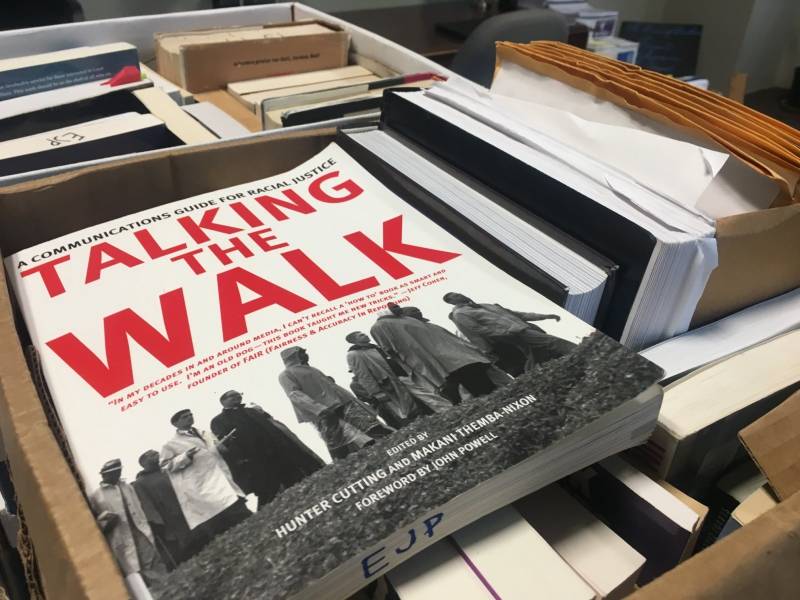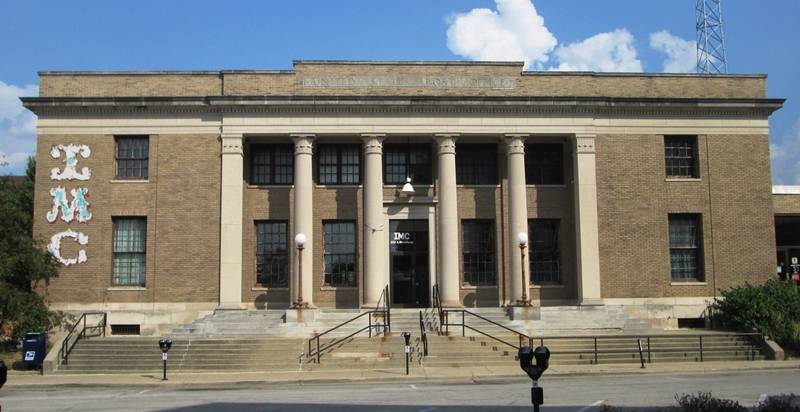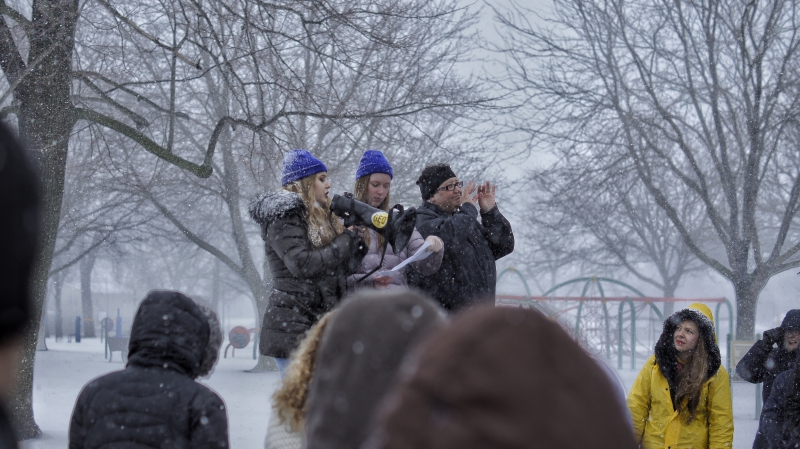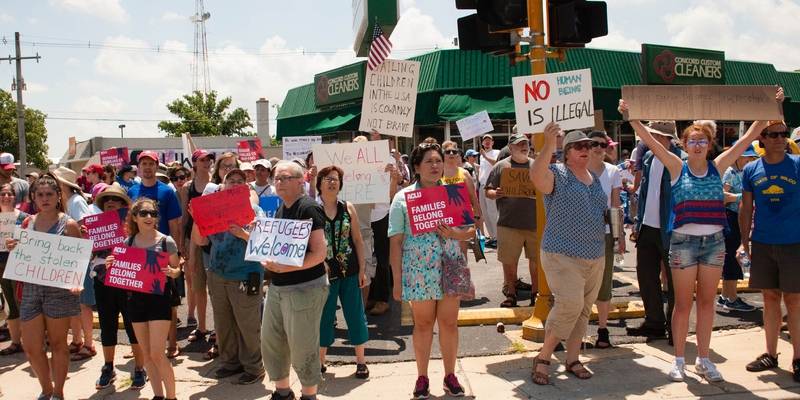Undoubtedly you’ve heard this quote from cultural anthropologist Margaret Mead, so often used as a motivator for social action and a handy phrase for march posters: “Never doubt that a small group of thoughtful, committed citizens can change the world; indeed, it’s the only thing that ever has.” In one concise thought it takes an overwhelming concept — altering the course of history — and manages to convey a message of hope, of possibility, that real change is possible.
Nowadays, change can be hard to envision, at least on a large scale. Every day we are assailed with news that ranges from exhausting and infuriating, to downright scary. Just in the last couple of weeks we’ve experienced three mass shootings, one of which was directly tied to the rhetoric perpetuated by the current administration and those who defend it; and hundreds of factory workers rounded up by ICE while their children were left at their schools and daycares with no one to pick them up. We are also having daily conversations about whether the President of the United States is actually racist (he is).
However, Trump’s election has inspired a surge of activism: marches, calls to representatives, sit-ins in government buildings, and an uptick in people, particularly women, inspired to run for offices from county board to U.S. Senator. Sometimes — okay, a lot of time — it feels unfruitful. Here in Champaign-Urbana, in Illinois District 13, we often find ourselves talking and tweeting at the human incarnation of a brick wall in Rodney Davis. And while the immense efforts of a group of thoughtful committed citizens created a county level “blue wave” here in 2018, the brick wall remained and launched another two years of beating our fists against it. When a slow wi-fi connection is enough to incite feelings of rage out of impatience, it’s difficult to maintain perspective. Time to recall another famous quote that appears on posters at marches and rallies, from Dr. King: “The arc of the moral universe is long, but it bends toward justice.”
Surely it does, right? If you need a touch of reassurance, these local examples might soothe your frustrated soul. National news comes at us at such a furious pace, these seem like ages ago but they are important to remember.
 Photo from Education Justice Project Facebook page
Photo from Education Justice Project Facebook page
Back in January, the Danville Correctional Center removed over 200 titles from the library operated by students in the Education Justice Project. The EJP is a college-in-prison program through the University of Illinois that provides post-secondary educational opportunities to men who have been incarcerated at DCC. This was accompanied by a denial of some course materials needed for spring semester courses. Dr. Rebecca Ginsburg, director of the EJP, details the timeline in the project’s Spring Newsletter. While prison administrators gave vague and conflicting reasons for these actions, with titles like Uncle Tom’s Cabin, The Souls of Black Folks, and Locking up Our Own: Crime and Punishment in Black America being removed and rejected, it was quite clearly a case of censorship of topics relating to race.
The mere existence of an organization like the EJP is an example of activism at work but in this particular case, because of the specific efforts Ginsburg and others, all of the materials were returned to the program. (We interviewed one of its success stories last year.) They took the matter to the media, and Lee V. Gaines from Illinois Newsroom took an in depth look at the story. Early this summer, Ginsburg, EJP librarian Holly Clingon, and EJP alumnus Michael Tafolla spoke at a subject matter hearing in the Illinois House. This situation has also launched a new campaign, Freedom to Learn, spearheaded by the EJP. The campaign is committed to protecting educational opportunities for incarcerated individuals and fighting censorship.
 Photo from Wikipedia Commons
Photo from Wikipedia Commons
Even more recently, the impact of local activism was on display as the existence of an important community resource was threatened by over-regulation. After an infraction relating to alcohol on the premises, the City of Urbana began requiring that the IMC apply for a permit 45 business days in advance, at $100 per event, for every event. Because of the sheer number of events that take place at the IMC each year, this would have certainly been crippling to the organization, which exists to “foster the creation and distribution of media and art that emphasizes underrepresented voices and perspectives, and to promote empowerment and expression through media and arts education.”
The community that supports UCIMC was not going to accept such an injustice. At a city council meeting in early June, the room was packed to standing room only as dozens of those with a stake in the survival of the IMC showed up in support. After a smaller meeting with Mayor Diane Marlin and IMC leadership, the city backed off the restrictive policy, only requiring permits for events that use public resources and/or involve alcohol, and they refunded fees already paid.
In the larger scope of things, these two instances might seem relatively insignificant, but they aren’t, especially when you consider the impact on the communities that are affected by important resources provided by the Education Justice Project and Independent Media Center. One can only deduce that similar wins are happening in cities, counties, and states throughout the U.S., and those wins add up to a better, more inclusive, more just society.
 Photo by Kwamé Thomas
Photo by Kwamé Thomas
It’s easy to get lost in the vortex of Twitter and CNN and be in a state of constant despair and anger and hopelessness. But if you take a closer look at what is happening around you, you will see progress. You will see others like you who are angry, but purposeful. A group of traumatized teenagers in Parkland, Florida inspired a surge of new voices and volunteers for the gun violence prevention movement, and those people are getting common sense legislation passed in states across the U.S. while the NRA crumbles. There are numerous organizations at national, state, and local levels devoted to supporting undocumented families with legal assistance and and advocacy. Last week was the fifth anniversary of the death of Michael Brown, Jr. and the protests in Ferguson, and we can see how the events of those weeks exploded the reach and the influence of the Black Lives Matter movement.
Yes, we are bending toward justice, but not without the actions of those “thoughtful, committed citizens” who are doing the work, some of whom have been doing the work for a long time. Follow their lead, listen to and learn from them, then offer your time and your talents, and realize that results aren’t always immediate. The Montgomery Bus Boycott lasted over a year; the Stonewall Riots launched the gay rights movement in 1969, yet same sex marriage didn’t become law until 2015. All you have to do is read the comments on WCIA or News-Gazette Facebook posts to know there is still an immense amount of work to be done.
Frustrated by our hapless representative? Call his offices to let him know, then join local efforts to get his opponent elected. Show up at school board meetings and city council meetings. Register voters and provide rides for voters. And for the love of god, vote.
If you have a particular issue you are passionate about, there is likely a way for you to get involved locally with your time or your resources. Here are just a few, of course there are many others:
- Immigrant rights: CU Fair, Three Spinners, The Refugee Center
- Racial Justice: Black Lives Matter CU, CU Showing up for Racial Justice
- Gun Violence Prevention: CU Moms Demand Action
- Reproductive Rights: Planned Parenthood of Illinois
- Environmental concerns: Champaign County Sustainability Network, Prairie Rivers Network
- LGBTQ+ support: The UP Center of Champaign County
The Smile Politely Editorial Board is Jessica Hammie, Julie McClure, and Patrick Singer.
Top photo by Megan Flowers








